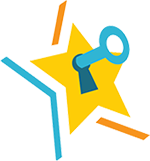This diverse and highly adaptable collection of resources is selected for adult education, higher education, workforce development, and career and technical education programs. We select a variety of printable, online, and other technology-enabled resources for teaching and assessing personal and workplace success skills. These include a variety of quality products — frameworks, assessments, comprehensive curriculum, and research — to accommodate the diversity of program models, service delivery goals, and intensity and duration of instruction.
For each resource, the library provides a brief description summarizing the contents, target audience, and key takeaways to suggest how the contents might be expanded, adapted, and customized more broadly. We also indicate whether a resource is open access, free, or fee- or subscription-based.
Library resources can be used to teach personal and workplace success skills independent from academic, language, or occupational skill development — for example, in stand-alone work readiness courses or workshops. They can also be integrated into academic, career and technical, and English language instruction, or advising and coaching.
Our Approach
Regardless of the format, personal and workplace success skills are best taught and practiced contextually, using real-life situations and materials to engage learners and workers in recognizing the value, utility, and transferability of these skills to achieve workplace, education, and personal goals.
In educational settings, the ideal approach is to incorporate these skills into all content and occupational skill instruction, rather than create separate courses or workshops for personal and workplace success skills instruction.
In workforce development settings, where personal and workplace success skills might be offered in short-term pre-employment and job readiness workshops, participants can practice and demonstrate the skills in resume writing and mock interviews.
Teaching the Skills
- Be transparent and explicit about the focus on personal and workplace success skills and engage participants in a discussion of why they are important and how they are applied in various life contexts and scenarios.
- Connect personal and workplace success skills to the concepts of transferable and portable skills that are valued in the labor market and enable people to upskill, advance in, and move across industries. Encourage participants to identify and describe these skills in resumes and job interviews.
- Provide opportunities for self-reflection and self-assessment as part of the learning process — for example, following a group activity or role play. Self-aware learning and meta-cognition are foundational to our ability to integrate, retain, and transfer these skills in multiple contexts and reflect the ability to take responsibility for our learning and growth.
- Allow time for review, reinforcement, ongoing practice, and reflection over time. As with any skills, these are best attained over time and with intentionality.
- Build individual skills while emphasizing that they are overlapping, mutually reinforcing, and rarely practiced in isolation from one another. For example, communication, emotional intelligence, self-management, and respecting differences are ingredients to effective teamwork and collaboration. Navigating and using information and flexibility and adaptability are key ingredients to creative and critical thinking and problem solving.
